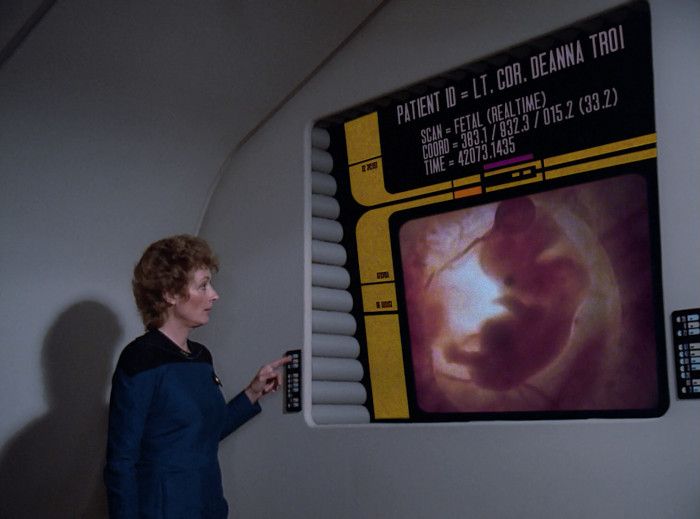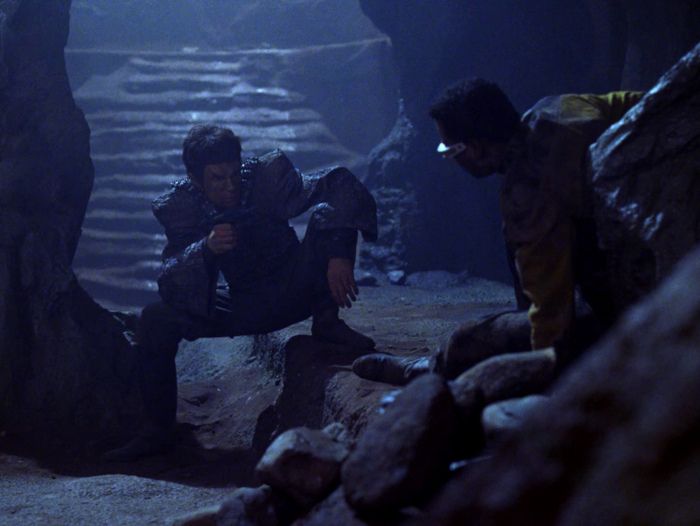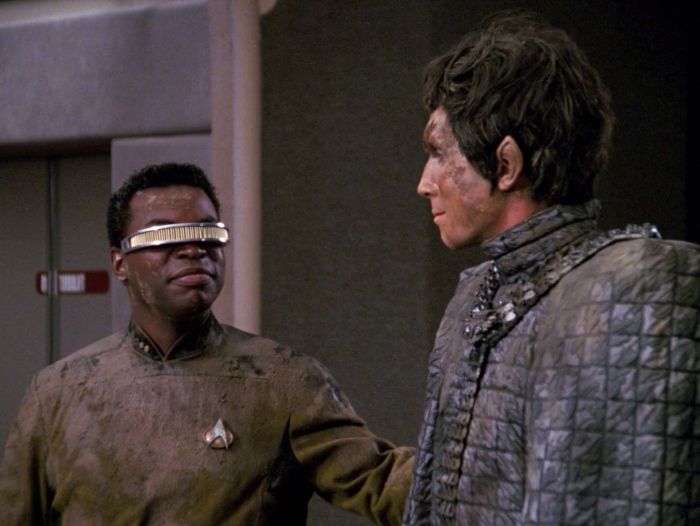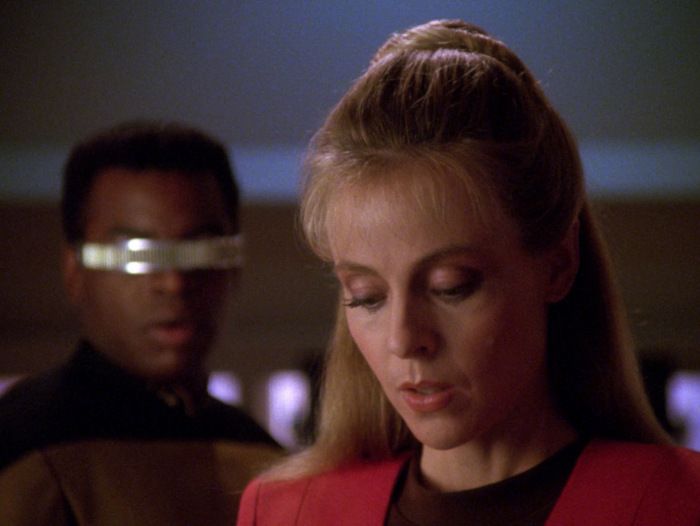Abortion in Star Trek: The Next Generation
Star Trek is known for a cast of characters who treasure life in all its forms — perhaps it's no surprise that this extends to the unborn.
In recent weeks abortion has been in the news even more than usual, because of various bills in America designed to massively curtail access to abortion in various US states. Most of the focus has been on Alabama, but other states such as Georgia and Missouri have passed similar laws. So now seems like as good a time as any to get around to rewatching a few TNG episodes and revisiting what they say about abortion. One of the basic tenets the crew lives by is that life in all its forms is precious and should be preserved — Picard even balks at wiping out the Borg when he has the chance in series 5 ("I, Borg") — so it's not surprising that it favours life over death when it comes to unborn children. There are a few episodes that touch on the issue. The first is "The Child" (series 2, episode 1), then there's "The Enemy" (series 3, episode 7), and finally "The Masterpiece Society" (series 5, episode 13) — these last two both deal with Geordi's congenital blindness and whether it would have been right to have aborted him because of it.
The Child
This one includes a direct discussion about abortion, although the water is muddied somewhat by the fact that the child in question is some sort of energy being that decides it wants to experience being physical and does so by becoming a foetus inside Counsellor Troi. This involves a rather creepy scene early on with a little ball of light slipping under the covers at the foot of Troi's bed while she sleeps and advancing on her womb. The baby develops incredibly fast, and Troi gives birth two days after becoming pregnant (which, conveniently, means the whole thing fits into a single episode).
Once it's understood what's happening (and while Troi is still pregnant), the senior staff get together for a conference to decide what to do about it. Oddly enough, Troi sits herself down at the far end of the conference table, while everyone else — Riker, Worf, Data, and Dr Pulaski — sits at Picard's end. Picard informs the room that Troi is pregnant by some unknown means, and invites discussion on what to do about it after Dr Pulaski has shared the details. At this point, the camera focuses on Troi. The conversation fades out slightly, and Troi is caught between staring at the screen where Pulaski has put up images of the developing baby and looking down and putting a hand on her belly. As she does this, the senior staff debate what to do. In this part of the scene only the men speak, though I'm not sure whether that was a conscious choice or whether it was an unintended consequence of the scriptwriting. The Enterprise senior crew is heavily male anyway, and in terms of writing Troi is necessarily silent, Pulaski has already had a lot of lines outlining the unusual pregnancy, and this exchange where Picard has asked for comments is the only point where Worf and Data, who you'd expect to be present, have any lines at all. In any event, the conversation goes like this:
Worf: Obviously the pregnancy must be terminated for the safety of the ship and the crew.
Riker: Worf, you can't assume the intent was belligerent!
Worf: That is the safest assumption.
Data: Captain, this is a lifeform, not to allow it to develop naturally would deny us the opportunity to study it.
Worf: If the foetus is aborted, laboratory analysis is still possible.
Riker: Doctor, is there any health risk to Counsellor Troi if the foetus is aborted?
(At this point the sound returns to normal)
Troi: (indignant) Captain. Do whatever you feel is necessary to protect the ship and her crew, but know this, I'm going to have this baby.
Picard: Then it seems that the discussion is over.
— Star Trek: The Next Generation, series 2, episode 1, The Child
On the face of it, you can make a pretty clear case for this being a pro-choice scene. A bunch of men start trying to decide what to do about this bizarre pregnancy, Troi announces that she's going to have the baby, and Picard decides that her word is final. But on closer inspection it seems to be quite the reverse.
First, note that the person to suggest an abortion is Worf. This is an early episode, and Worf's still pretty trigger-happy, and generally when he jumps straight to suggesting shooting something they haven't seen before we, as the audience, are supposed to roll our eyes. Come on, Worf, that's not the Star Trek way, you're on a mission to seek out new life, not blow it up. Time and again the crew of the Enterprise acts to preserve life, often at considerable risk to themselves. Not just so they can study it, as Data suggests in his awkward way, but because it is precious in and of itself.
Second, the way Troi acts suggests she's much more angry at the thought of someone wanting to kill her child than the affront to her autonomy. Her gazing at the picture of the developing baby and the hand on her tummy come across as the actions of a woman who knows she's carrying a person inside her. Of course she's going to have the baby, this is Star Trek, that's what you do when you're convinced that life, even unknown life, is precious.

Troi's unborn baby, already a person to her, it seems.
(Image: CBS Studios)
Although the crew are discussing abortion, this doesn't tell us much about abortion law in the Federation. Given that Worf's grounds for suggesting it is that the baby might turn out to be a risk to the ship and the crew, even a law that only allows abortion if the mother's life is in danger would probably give the crew enough wiggle room if they wanted it.
In the end, it turns out that Worf was right; Troi's son, who she names Ian, emits an unusual form of radiation (a convenient Star Trek plot device if ever there was one) that puts the ship in danger, and so he voluntarily gives up his physical body and leaves the ship, because he too, it seems, treasures life.
The Bible repeatedly says that we are people before we are born, already known to God. In fact, the Bible says that we're known to God before we're even conceived. The first thing God says to Jeremiah when he calls him as a prophet is this:
“Before I formed you in the womb I knew you,
before you were born I set you apart;
I appointed you as a prophet to the nations.”
— Jeremiah 1:5
Isaiah says something similar. One idea that runs through the Bible is God's sovereignty, that he's entirely in charge of history and of our lives.[1] So it's no surprise that Paul is able to write to the Ephesian church that before God created the world he'd already chosen them to be rescued from their sins and to be considered pure and blameless because of Jesus death: Ephesians 1:1-14
King David wrote a particularly beautiful description of being "woven together" in his mother's womb by the God who already knew all the wonderful things he would do for and through him:
For you created my inmost being;
you knit me together in my mother’s womb.
I praise you because I am fearfully and wonderfully made;
your works are wonderful,
I know that full well.
My frame was not hidden from you
when I was made in the secret place,
when I was woven together in the depths of the earth.
Your eyes saw my unformed body;
all the days ordained for me were written in your book
before one of them came to be.
— Psalm 139:13-16
If, then, we are people known and loved and treasured by God before we are born or even conceived, it should be clear that Troi was on the right track to react with outrage at the idea that her unborn child should be killed on the off-chance he was a danger. We are God's precious creations, fearfully and wonderfully made for a relationship with him. Seen in that light, the idea that we should allow a doctor to kill one person at the request of another is offensive in all but the most exceptional circumstances. There are situations where continuing a pregnancy would kill both the mother and the baby. There's no happy outcome to that scenario, but if we can save one of them, it's right to do so. Doctors sometimes have to make similar decisions with conjoined twins after birth. Barring that kind of situation, however, how can we justify killing an unborn child?
The Enemy
This episode, alongside "The Masterpiece Society", discusses a more limited aspect of the abortion debate, the question of aborting those who have a disability of some kind. In both cases, the plot turns on Geordi's congenital blindness, and that in other societies he wouldn't have been allowed to live because of it. In both cases Geordi's visor, and the fact that in many ways it gives him vision that's superior to ours, is relevant to the plots — if Geordi had been aborted, and hadn't been present with his visor, things would have turned out for the worse. (I think the focus on Geordi's visor is somewhat unhelpful, as I'll discuss below, but the conversations Geordi has are well worth examining.)
"The Enemy" contains two discussions about life. Geordi ends up stranded on a very inhospitable planet, Galorndon Core. The Enterprise has responded to a distress call which turns out to be from a Romulan ship that's crossed the Neutral Zone and is in Federation space illegally. During a window in the electrical storms that ravage the planet, a team beams down, but Geordi falls into a pit and isn't able to make it back before the window closes and Riker and Worf beam out with a Romulan survivor Worf found. (This mostly happens because of Riker's excellent plan that the three of them split up and scout the area alone. Thanks, Riker.)
Geordi's visor immediately comes in useful, helping him see how to climb out of the pit he's fallen into. Soon after, he gets jumped and knocked out by a second Romulan survivor. His captor later gets injured in a rock fall, and even though Geordi helps him to safety he pulls a gun on him. Geordi is able, through his visor, to spot that the Romulan is getting seriously ill because of the electrical storms, and explains to the confused Romulan how he can tell.
Geordi: (Tapping the visor) It translates a wide range of radiation into neural impulses, allows me to see.
Romulan: Without it you're blind?
Geordi: Yeah.
Romulan: How did this happen?
Geordi: I was born this way.
Romulan: And your parents let you live?
Geordi: What kind of question is that? Of course they let me live!
Romulan: No wonder your race is weak, you waste time and resources on defective children.
— Star Trek: The Next Generation, series 3, episode 7, The Enemy
It seems likely (especially in light of a conversation in "The Masterpiece Society" that we'll come on to) that Geordi's parents would have known that he'd be born blind beforehand. Barely a week goes by on the Enterprise without someone having their neural pathways scanned in sick bay, and the ability to spot Geordi's blindness before his birth certainly seems well within the bounds of Federation technology. If his parents had wanted to abort him on the basis of his disability, they'd have had ample opportunity.

Geordi being held at gunpoint by his Romulan captor.
(Image: CBS Studios)
Meanwhile, on the ship, the other Romulan also isn't doing well — he's dying, and needs a ribosome transfusion that the replicators conveniently (at least for the plot) can't produce. After testing the crew it turns out that, surprisingly, Worf is the only match on board. The Enterprise makes contact with a Romulan ship that's come looking for the survivors, and the ship's commander, Tomalak, demands that the injured Romulan be returned to them. Picard doesn't want to go to meet them because Geordi's still stuck on the planet.
And so two parallel life-and-death stories play out. On Galorndon Core Geordi and his Romulan captor, Bochra, work together, with Geordi's visor proving vital in being able to spot the probe that the Enterprise has sent to the surface for Geordi to rendezvous with. On the ship, Worf is once again playing the role of showing what happens when the Federation's ideals are rejected — he refuses to allow the transfusion because of his hatred of the Romulans, who killed his parents.
Various people try to talk Worf round, because if the Romulan dies in the care of the Federation it could spark an incident that could lead to war. Picard stops short of ordering Worf to submit to the procedure, and the Romulan dies (though he also told Worf to his face "I would rather die than pollute my body with Klingon filth", so he might have refused anyway).
On the other hand, down on the planet, because Geordi's parents didn't have him aborted because he would be blind, he and Bochra are able to escape. The episode lays things on pretty thick here. Escape is only possible because of Geordi's visor, had anyone else been stranded on the planet they'd have been stuck. Geordi and Bochra are beamed back onto the ship just in time to prevent a possible fight between the Enterprise and the Romulan warbird, which has already dared to cross the Neutral Zone and enter Federation space. Bochra assures Tomalak that he hasn't been mistreated, and in fact owes Geordi his life. He returns to the Romulan ship and they leave peacefully.

Geordi and Bochra, safely aboard the Enterprise.
(Image: CBS Studios)
Arguably, therefore, Geordi being allowed to live by his parents prevented war with the Romulans. It's a bit over the top, but the point stands. Those born with disabilities are no less human beings than those born without, with no less inherent worth. Those with disabilities should not be regarded merely as objects of pity, nor should they be erased, and they're perfectly capable of living full, worthwhile lives and having a positive impact on those around them.
And indeed, that's a message we're keen to promote about those with disabilities once they've been born. Having a disability is a protected characteristic in the UK, it's illegal to discriminate against someone because of it, and there are similar laws around the world. We expend time and money ensuring that those whose mobility is impaired have access to public spaces, though provision for this kind of thing is far from perfect. We train specialist carers and teachers to look after and educate those who need particular help — again, this is frequently under-provisioned, but the fact that politicians will decry this state of affairs (even if they rarely get round to doing anything about it) and that it's generally seen as a Bad Thing shows a general understanding of the ideal that everyone, no matter their disability, is a human being of equal inherent worth and deserving of dignity.
Unless, perhaps, they haven't been born yet.
When the Paralympics came to London in 2012, a group of doctors, academics, and religious leaders came together to write a letter published in the Telegraph with an accompanying article that made exactly this point.
In 2017 Lord Shinkwin, himself born with a rare genetic bone disease, introduced a bill to the UK parliament (later defeated) to repeal the part of the 1967 Abortion Act that waives the 24 week limit for abortions if the unborn child has a disability. He described the current law as "a licence to kill for the crime of being disabled".
Poor provision of services for the disabled makes it hard to believe that we really place equal value on those with disabilities. That the law allows abortions up to birth because of disability makes it nigh impossible. Babies are even being aborted for treatable conditions such as cleft palates.
The Bible makes it clear that God has no less love for those with disabilities than those without. Jesus spent considerable time healing the sick, including a man born blind. He mentions this himself in Matthew 11:5 as he sends a message to John the Baptist to reassure him that he really is the Messiah: "The blind receive sight, the lame walk, those who have leprosy are cleansed, the deaf hear, the dead are raised, and the good news is proclaimed to the poor."
Indeed, God's compassion and justice mean that he has a particular concern for the vulnerable, and he expects his people to act similarly — the end of Deuteronomy 24 even outlines an agricultural welfare system to ensure that those who are unable to support themselves are able to get by.
The unborn are our most helpless and vulnerable members of our race, and we should have a particular care for them. Those born with disabilities also have an additional set of struggles in life, and to attempt to erase them rather than treasure them is hardly the care for the vulnerable that God calls us to.
(As an aside before we move onto the last episode, Picard's refusal to force Worf to undertake the procedure also has something to say about abortion. If we agree that it's wrong to force someone to undergo a simple, safe procedure for the benefit of another, then it's surely also wrong to force an unborn child to die for the benefit of the mother.)
The Masterpiece Society
This episode doesn't say much about the issue that "The Enemy" doesn't, but it does reinforce the point. Here the crew unexpectedly comes across a colony of genetically-engineered humans[2]. The colony's existence is threatened by a plot device stellar core fragment which will pass by their planet. They live in a biosphere on an otherwise inhospitable world, and the gravitational forces inflicted by the fragment as it passes by will destroy the dome and kill the inhabitants.
Once again, Geordi and his visor are critical in saving the day — they adapt the technology in the visor to upgrade the ship's tractor beam to push the core fragment off course, a possibility that comes to Geordi as he has another awkward conversation about his blindness with one of the genetically-engineered colonists, Hannah Bates:
Geordi: I haven't had any sleep in so long my eyelids feel like they have lead weights attached to them. (He removes his visor, showing his white-filmed eyes)
Hannah: Geordi!
Geordi: Hmm?
Hannah: Were you always blind?
Geordi: (Smiling) Sorry, I probably shocked the hell out of you, didn't it?
Hannah: No! (Geordi moves to replace his visor) Don't! I didn't mean to embarrass you.
Geordi: Never been embarrassed by this, Hannah, never. I was born blind. It's always been this way.
Hannah: May I see it, your visor?
Geordi: Sure. (He hands it over) So, guess if I'd been conceived on your world I wouldn't even be here now, would I?
Hannah: No.
Geordi: No, I'd have been terminated as a fertilized cell.
Hannah: It was the wish of our founders that no-one have to suffer life with disabilities.
Geordi: Who gave them the right to decide whether or not I should be here? Whether or not I might have something to contribute?
Hannah: I don't know what to say.
Geordi: Ah.
Hannah: Here you go. (she hands the visor back) How does it work?
...
(They discuss the visor and its technology. This gives Geordi an idea about how to boost the ship's tractor beam.)
...
Hannah: We'd have to avoid tractor force rebounding, but that shouldn't be hard.
Geordi: Sure, with a few modifications...oh, that's perfect!
Hannah: What?
Geordi: If the answer to all of this is in a visor created for a blind man who never would have existed in your society.
— Star Trek: The Next Generation, series 5, episode 13, The Masterpiece Society

Geordi, Hannah, and the (allegedly) all-important visor.
(Image: CBS Studios)
In spite of Geordi's triumphant amusement here, as I mentioned above, when I rewatched these episodes I actually found one aspect of the plots unsettling. When they attempt to "prove" Geordi's value in the face of his blindness, they use the special abilities given to him by his visor. Geordi isn't a blind man who makes a valuable contribution regardless of his condition, he's vital because of something the visor can do, not him. This does mean that you can't argue that if Geordi had been aborted and someone else had been chief engineer the day would have been saved anyway[3], but that misses the point. That Geordi should have been allowed to live despite his blindness isn't because he'd one day have a technological superpower, but because he's a human being. He'd have had many opportunities to live a life that influenced the world for the better even without a visor — but even that misses the most fundamental point: someone's human worth and right to life aren't dependent on someone else being able to get something out of them. Being a relational creature and using our time and abilities to serve others is certainly part of what we were made for, but those things flow out of our basic value and existence, they don't give rise to them.
Still, even if the plot writing is a little ham-fisted, the dialogue itself does its job very well, challenging the idea that we have the right to determine someone's value and their right to life based on whether they are able-bodied.
Right at the start of the Bible, we're told that we were made in God's image. We are like him in ways the rest of his creation isn't, we exist for a relationship with him, and we exist to reflect his glory to the rest of the universe. This is true of all people without distinction — male or female, tall or short, able-bodied or otherwise. This means that those with disabilities are just as treasured by God as those without, and that should be reflected in the way we treat anyone with a disability. And that includes before they are born.
Star Trek's characters have always treasured life in all its forms. They're not a perfect pattern for a society living according to God's good designs for humanity, but in this regard, and in the pro-life message Star Trek communicates through them, they're well worth emulating.
The Bible never claims that God's sovereignty absolves us from responsibility for our actions. In fact, the Bible unashamedly says both that we're morally responsible, but that we cannot escape God's plans, and it's entirely unapologetic about this apparent paradox. It's something we can't really get our heads around, but we're always going to struggle to fully comprehend an eternal God from our limited, temporal perspective. ↩︎
Oddly enough, their leader, Aaron Conor, is played by the same actor who was Geordi's Romulan captor in "The Enemy". ↩︎
There doesn't seem to be a reason why a normally-sighted person in the Federation couldn't be fitted with a visor and receive the same abilities if they wanted to, so even that point doesn't really stand up. However, the fact that Federation citizens don't seem to do this is itself encouraging — they seem to realize that our worth isn't dependent on our abilities, and that we don't need to be "upgrading" ourselves in order to be valuable. ↩︎